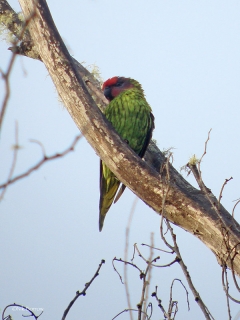Goldie’s Lorikeet |
|
|
Also known as: Red-capped Streaked Lory
Photos
View in GalleryDid You Know?
The Goldie's Lorikeet was almost unknown in aviculture until the mid-1970s.Academic Research
Related publications: Psitteuteles goldieiSpecies Profile
Genus: Psitteuteles | Species: goldiei
Size:
19cm (7.4 in)
Weight:
45-57g (1.5-2 oz)
Subspecies including nominate:
one
Colour Adult:
Both adults in general green to yellow/green in colour, red crown, duller and less extensive in female; blue occiput; lilac/pink cheeks streaked with blue; yellow/green underparts streaked with dark green. Bill black. Eye brown.
Colour Juvenile:
As in adults but with red frontal band; green crown; dull grey/blue occiput; green cheeks washed with pale pink and blue. Bill brown. Eye brown.
Call:
Calls are unusual hissing or wheezing sounds. Also soft, single syllable, whispery hissing while feeding.
Listen NowVideo Links:
Video 1More Information:
Content Sources:
CITES
BirdLife International
Cornell Lab of Ornithology/Birds of the World
Parrots: A Guide to Parrots of the World, Juniper and Parr, 1998
ML Media Collection Catalogue 139654, Goldies's Lorikeet Psitteuteles goldiei, Beehler, Bruce, Papua New Guinea, Sep. 8 2005, Cornell Lab of Ornithology. Site
Parrots of the World, Forshaw, 2006. 2010 edition
Parrots in Aviculture, Low, 1992.
Lexicon of Parrots, Thomas Arndt.
Photos
View in GalleryDid You Know?
The Goldie's Lorikeet was almost unknown in aviculture until the mid-1970s.Academic Research
Related publications: Psitteuteles goldieiSpecies Care
Captive Status:
Fairly common
Longevity:
12-15 yrs
Housing:
Enclosure with well drained tile or concrete floor, 1.2m (4 ft) minimum length.
Diet:
Commercial or homemade nectar, the latter made fresh daily from baby cereal (lactose free), honey and malt extract or molasses, mixed with filtered water and made fresh daily, comprising at least 40 percent of the diet; fruit such as: apple, pear, banana, orange, cactus fruits; vegetables such as: carrot, fresh corn; dried figs soaked in water for a few hours; spray millet and a small amount of soaked or sprouted sunflower seed and small amount of canary seed and/or oats.
Enrichment:
Provide regular baths, provide browse and foliage for playing and hiding in, not chewing; provide swings, ladders and ropes.
Nest Box Size:
Diagonal roosting and nest box 6" x 12" x 6" (15cm x 30.5cm x 15cm).
Clutch Size:
2
Incubation Time:
23 days
Fledging Age:
8 weeks
Hatch Weight:
Not recorded.
Peak Weight:
52g (1.8 oz)
Weaning Weight:
45g (1.6 oz)
Photos
View in GalleryDid You Know?
The Goldie's Lorikeet was almost unknown in aviculture until the mid-1970s.Academic Research
Related publications: Psitteuteles goldieiSpecies Wild Status
World Population:
Unknown, stable.
IUCN Red List Status:
Least Concern
CITES Listing:
Appendix II
Threat Summary:
Not globally threatened. Generally fairly scarce but locally common, particularly near Tari Gap, Papua New Guinea. This is thought to be in response to local food availability.
Range:
Found in the highlands of New Guinea, east from Weyland Mountains, Irian Jaya.
Habitat:
Seen in montane primary forest and Eucalyptus woodland up to 2800m (9184 ft). May also be found at sea level.
Wild Diet:
Diet includes flowers of Elaeocarpus, Poikilospermum, Eucalyptus, Grevillea and Dimorphanthera; psyllid lerps in casuarinas may be an important food.
Ecology and Behaviour:
Are commonly encountered in groups of 30 individuals or more. Flocks make long daily flights from roosting sites to feeding areas in the mid-storey and canopy of flowering trees. There is a seasonal pattern to the birds' movements.
Clutch and Egg Size:
2 eggs
Breeding Season:
September-October. Nest is in base of dead fronds in lower crown of Pandanus tree. Also seen in moss forest/grassland edge.
Related Links:
Photos
View in GalleryDid You Know?
The Goldie's Lorikeet was almost unknown in aviculture until the mid-1970s.Academic Research
Related publications: Psitteuteles goldieiMembers Only Resources
Please log-in now to find more research, resources and tools.
Not a Member?
Find more great information:
Gain exclusive access to 600+ pages of additional research, seminars and podcasts, specialists to ask your toughest questions, and dozens of other fun resources - when you become a WPT member.
Join Today >>

































